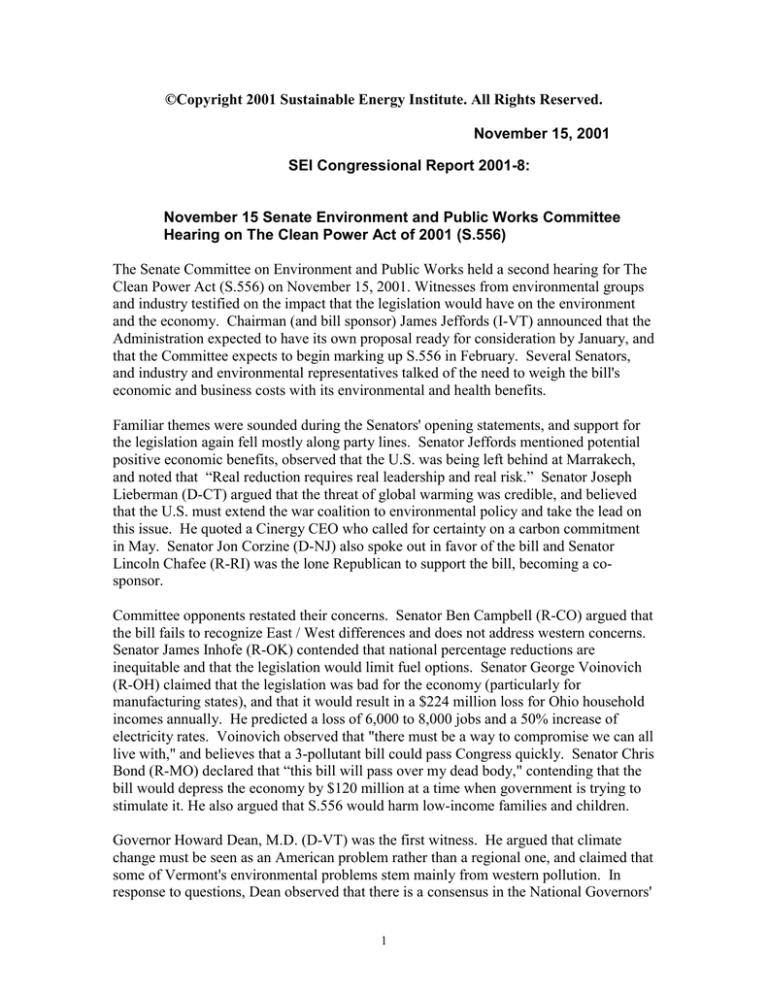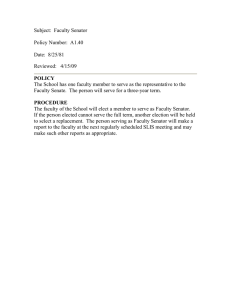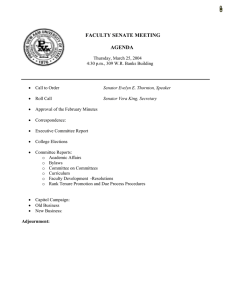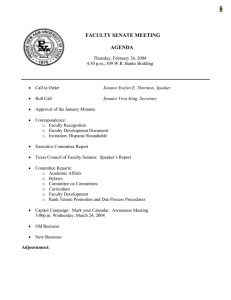
©Copyright 2001 Sustainable Energy Institute. All Rights Reserved.
November 15, 2001
SEI Congressional Report 2001-8:
November 15 Senate Environment and Public Works Committee
Hearing on The Clean Power Act of 2001 (S.556)
The Senate Committee on Environment and Public Works held a second hearing for The
Clean Power Act (S.556) on November 15, 2001. Witnesses from environmental groups
and industry testified on the impact that the legislation would have on the environment
and the economy. Chairman (and bill sponsor) James Jeffords (I-VT) announced that the
Administration expected to have its own proposal ready for consideration by January, and
that the Committee expects to begin marking up S.556 in February. Several Senators,
and industry and environmental representatives talked of the need to weigh the bill's
economic and business costs with its environmental and health benefits.
Familiar themes were sounded during the Senators' opening statements, and support for
the legislation again fell mostly along party lines. Senator Jeffords mentioned potential
positive economic benefits, observed that the U.S. was being left behind at Marrakech,
and noted that “Real reduction requires real leadership and real risk.” Senator Joseph
Lieberman (D-CT) argued that the threat of global warming was credible, and believed
that the U.S. must extend the war coalition to environmental policy and take the lead on
this issue. He quoted a Cinergy CEO who called for certainty on a carbon commitment
in May. Senator Jon Corzine (D-NJ) also spoke out in favor of the bill and Senator
Lincoln Chafee (R-RI) was the lone Republican to support the bill, becoming a cosponsor.
Committee opponents restated their concerns. Senator Ben Campbell (R-CO) argued that
the bill fails to recognize East / West differences and does not address western concerns.
Senator James Inhofe (R-OK) contended that national percentage reductions are
inequitable and that the legislation would limit fuel options. Senator George Voinovich
(R-OH) claimed that the legislation was bad for the economy (particularly for
manufacturing states), and that it would result in a $224 million loss for Ohio household
incomes annually. He predicted a loss of 6,000 to 8,000 jobs and a 50% increase of
electricity rates. Voinovich observed that "there must be a way to compromise we can all
live with," and believes that a 3-pollutant bill could pass Congress quickly. Senator Chris
Bond (R-MO) declared that “this bill will pass over my dead body," contending that the
bill would depress the economy by $120 million at a time when government is trying to
stimulate it. He also argued that S.556 would harm low-income families and children.
Governor Howard Dean, M.D. (D-VT) was the first witness. He argued that climate
change must be seen as an American problem rather than a regional one, and claimed that
some of Vermont's environmental problems stem mainly from western pollution. In
response to questions, Dean observed that there is a consensus in the National Governors'
1
Association for a 3-pollutant plan. He noted that one enormous problem comes from
mobile sources (cars), which is not covered by this bill, but added that S.556 can address
the wind sources. He insisted that the US cannot become another China trading economic
growth for pollution, and argued that he problem must be addressed federally.
Responding to Senator Voinovich, Dean stressed that no one wants to eliminate coal as a
power source, but added that the United States can and should make it cleaner. Dean also
stated that he is particularly concerned with mercury, which the 4-pollutant bill would
address. He concluded that global warming is a real problem and that those who don’t
agree that that is the case do not understand the science. Similar to dealing with a budget
issue, Dean argued that the earlier you address a problem, the better.
Panel 2 was made up of energy industry representatives, and the panel not surprisingly
reflected industry concerns about the proposed legislation. In particular, witnesses
emphasized the need for maximum flexibility and reasonable timetables. These
witnesses argued that projected costs were unclear, the bill might inhibit innovation, and
that mercury, in particular was a problem that needed to be addressed. While the panel
voiced concerns about the bill in its current form, some witnesses favored some type of
federal approach over a state "patchwork" approach. Several stressed the need for
regulatory certainty. More specifically,
•
Gerard Anderson, President & CEO of DTE Energy Resources voiced his support for
continued progress on emission reductions, but stipulated that such progress should
be achieved through proper design with regulations that don’t overlap. He outlined 6
criteria for streamlined regulation, including: (1) the maintenance of fuel diversity;
(2) maximum flexibility to achieve the reductions; (3) adequate time for compliance;
and (4) reductions must be cost effective and manageable.
•
Jeffry Sterba, Chairman, President & CEO of the Public Service Company of New
Mexico echoed Senator Campbell's concerns, contending that the bill responds to
concerns that do not exist in his region, and told Senator Voinovich that across-theboard reductions would be inappropriate. He expressed concern about the issue of
global warming as a "long-term" issue, and believed that the bill's goals would force
a fuel switch to natural gas.
•
Robert LaCount of the G&E National Energy Group stated that S.556 is not
integrated in an achievable way and will cause compliance and litigation problems.
He claimed that it was important to “build off of existing, proven programs, allow
time for current compliance schedules to be fully implemented, and rationalize future
emissions reduction programs by coordinating timetables and implementation
approaches," and cited an example of such a program.
•
Jeffrey Smith from the Institute of Clean Air Companies believed that technology will
be available to address NOx and CO2 levels if the bill passes in its present form, but
added that addressing mercury and coal plants would be problematic due to
regulatory uncertainty. Smith contended that the marketplace can choose best
approach rather than legislating universal approach
2
The final panel consisted of representatives from environmental and health groups and a
miners' union. The environmental and health representatives unanimously supported the
legislation, and sought to counter opponents' arguments. These witnesses argued that
voluntary compliance does not work, but agreed with industry that regulatory certainty is
needed.
•
David Hawkins, Director of the Natural Resources Defense Council Climate Center,
argued that the voluntary approaches to CO2 reductions that industry favors do not
work and cited statistics to back this contention up. Additionally, he disputed the
industry's "price increase arguments, claiming that CO2 caps “would change the
incentives and promote investments in efficiency, renewable energy and CO2 capture
and avoidance measures.” Hawkins also challenged the East / West argument,
arguing that “the West continues to contribute to adverse health and environmental
effects, and that NOx causes significant problems in the west," with power plants
being a significant source.
•
Ronald Tipton from the National Parks Conservation Association focused on the bill's
impact on national parks, noting that there is a serious visibility issue with the vistas,
acid rain, and health problems for workers and visitors. He cited lingering problems
from a loophole in the Clean Air Act of 1977, and spoke of the need to clean up the
worst power plants. Tipton quoted Senator Thompson's letter to President Bush,
which stated that hikers in national parks experience worse air quality than walkers in
major urban cities. He added that a recent report indicates that improved air quality
would result in 25% increase in park attendance resulting in over $700 million to the
economy through ticket sales and local economies.
•
John Kirkwood, CEO of the American Lung Association, also supported the
legislation, noting that 41 million Americans live in areas where the air is unhealthy.
He contended that premature death was the most serious problem, and claimed that
31,000 premature deaths are annually attributed to coal plants. He also noted that
ozone problems cause 600,000 asthma attacks a year, and argued that all studies cited
in written testimony offer a compelling case to act sooner rather than later.
The only dissenting voice on the last panel was Cecil Roberts, the President of the United
Mine Workers of America. He testified that UMWA supports additional reductions in
SO2, NOX and mercury from coal fired power plants, provided that reductions preserve
coal miner jobs. Roberts expressed concern that the bill would lead to lost miner jobs
and devastated local economies, citing the experience of previous legislation on coal
producing states. He told Senator Voinovich that 3 jobs are lost in every community
where 1 coal miner job is lost.
3



